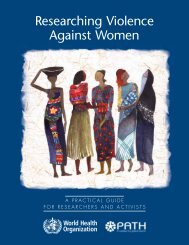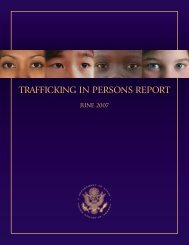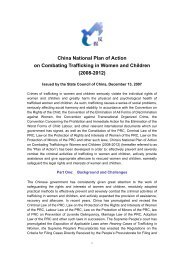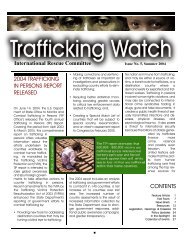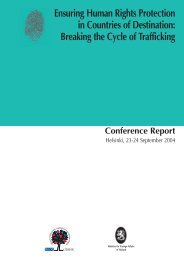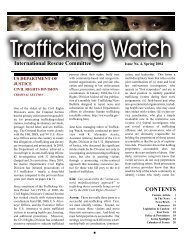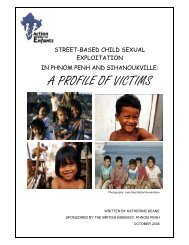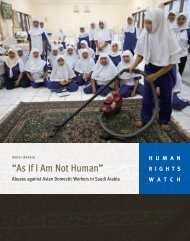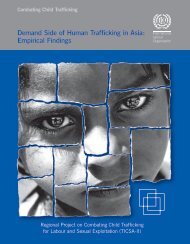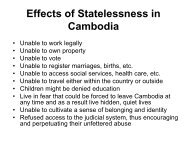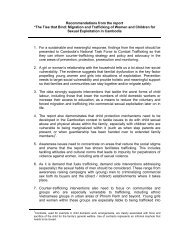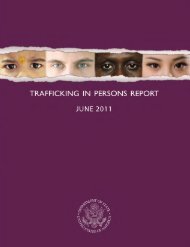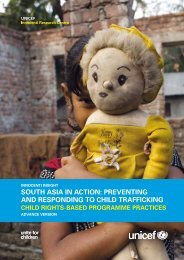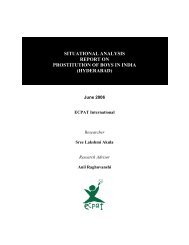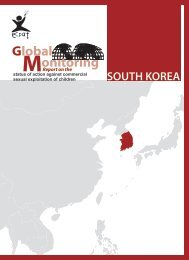Download PDF - Violence Against Children - East Asia and the ...
Download PDF - Violence Against Children - East Asia and the ...
Download PDF - Violence Against Children - East Asia and the ...
Create successful ePaper yourself
Turn your PDF publications into a flip-book with our unique Google optimized e-Paper software.
Cambodia<br />
This drawing by a child scrap collector shows details of life <strong>and</strong> work on a<br />
garbage dump. While <strong>the</strong> artist used bright colours <strong>and</strong> <strong>the</strong> picture is not<br />
entirely gloomy, note (left) two children dreaming of leaving <strong>the</strong> dump <strong>and</strong><br />
going to school, <strong>and</strong> (right) two children sniffing glue from bags.<br />
Photo: World Vision Cambodia<br />
of life that lead to maturity in adulthood.<br />
Moreover, in order to achieve effective <strong>and</strong><br />
sustainable income generation, it is crucial<br />
that <strong>the</strong> children learn of <strong>the</strong> personal <strong>and</strong><br />
financial costs involved in running <strong>the</strong>ir<br />
own business. Consequently, we require<br />
<strong>the</strong>m to share in <strong>the</strong> costs by providing<br />
part of <strong>the</strong> capital, buying <strong>the</strong>ir own<br />
supplies <strong>and</strong> materials, providing <strong>the</strong>ir own<br />
lunches, etc. They are also accountable<br />
(along with <strong>the</strong>ir parents) for <strong>the</strong> care <strong>and</strong><br />
maintenance of any equipment <strong>the</strong>y use,<br />
<strong>and</strong> paying for <strong>the</strong>ir repair or replacement<br />
if necessary.<br />
Overall, <strong>the</strong> children are given<br />
responsibility for developing <strong>the</strong>ir own<br />
skills <strong>and</strong> businesses <strong>and</strong>, ultimately,<br />
earning <strong>the</strong>ir own profits. In addition to<br />
contributing to character development <strong>and</strong><br />
value formation, this helps keep <strong>the</strong><br />
children focused <strong>and</strong> serious about <strong>the</strong><br />
tasks at h<strong>and</strong>. Ano<strong>the</strong>r important benefit is<br />
<strong>the</strong> sense of accomplishment <strong>and</strong> pride<br />
that results when <strong>the</strong> children successfully<br />
meet <strong>the</strong>ir obligations <strong>and</strong> reap <strong>the</strong><br />
rewards of hard-earned income, skills <strong>and</strong><br />
praise from parents <strong>and</strong> staff.<br />
3. An emphasis on poverty alleviation<br />
through income generation<br />
Emergence of social problems where <strong>the</strong>re<br />
was a lack of employment opportunity for<br />
parents was a finding of World Vision’s<br />
study on child abuse <strong>and</strong> neglect. 7<br />
Increased attention to improving economic<br />
opportunity of families at risk was a<br />
recommendation. Because of <strong>the</strong> role<br />
poverty plays in child labour, <strong>and</strong> its effect<br />
on <strong>the</strong> family as a whole, we decided that<br />
<strong>the</strong> goal of our income-generating activities<br />
for children should have <strong>the</strong> concrete<br />
result of a net increase in income.<br />
This is in line with World Vision<br />
Cambodia’s overall strategy of poverty<br />
alleviation, which includes income<br />
generation for <strong>the</strong> children’s parents, so<br />
that <strong>the</strong> whole family is targeted <strong>and</strong><br />
involved in increasing <strong>the</strong>ir household<br />
income. This approach is supported by <strong>the</strong><br />
experience of o<strong>the</strong>r groups working with<br />
scrap collectors such as <strong>the</strong> Association for<br />
<strong>the</strong> Protection of <strong>the</strong> Environment in<br />
Cairo, Egypt, which found that<br />
“...making money had proved, in many o<strong>the</strong>r<br />
similar development projects, to be <strong>the</strong> most<br />
efficient way of creating change. It was faster<br />
<strong>and</strong> more appealing than health awareness or<br />
literacy. The very dire context of poverty <strong>and</strong><br />
deprivation signified that any programme had to<br />
have an immediate effect on peoples’ lives.<br />
Economic empowerment was <strong>the</strong> result.” 8<br />
The bottom line is that if livelihood <strong>and</strong><br />
income issues are not addressed, poverty<br />
will continue to be a threat to <strong>the</strong> wellbeing<br />
of <strong>the</strong> child <strong>and</strong> his/her family.<br />
The situation is summed up well by Assefa<br />
Bequele in Child Labour <strong>and</strong> Minimum Social<br />
St<strong>and</strong>ards: The challenge for <strong>Asia</strong>:<br />
“Last but not least is <strong>the</strong> question of what is<br />
being done to deal with poverty, with <strong>the</strong><br />
situation of <strong>the</strong> poorest of <strong>the</strong> poor?<br />
7<br />
8<br />
Dorning, K, Crying Out: <strong>Children</strong> <strong>and</strong> communities speak on abuse <strong>and</strong> neglect, World Vision International, 2002 (http://www.wvi.org/imagine/can.htm)<br />
Education to Fight Exclusion, No. 3, UNESCO, 1999, p. 17<br />
26



